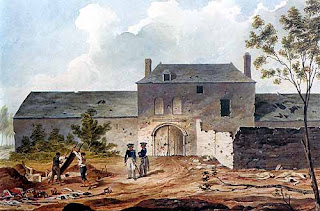 I’m writing the last chapter of Leo’s Story, my book connected to The Diamonds of Welbourne Manor. Have I mentioned it is due June 1?
I’m writing the last chapter of Leo’s Story, my book connected to The Diamonds of Welbourne Manor. Have I mentioned it is due June 1?
As the daughter of an Army officer, I have a particular regard for soldiers, which led to my Three Soldiers Series: Gallant Officer, Forbidden Lady; Chivalrous Captain, Rebel Mistress; Valiant Soldier, Beautiful Enemy. In my other books some of the heroes are soldiers and I almost always mention the war with Napoleon.
Major Cocks served in various capacities in the Peninsular war. He was attached to the regular Spanish army for a time and also with the 16th Light Dragoons. He worked as an intelligence officer behind enemy lines, performed special missions for Wellington, and was a field officer commanding soldiers. His family wanted him in Parliament, but Charles, as he was called, loved soldiering more than anything else. He was the consummate professional soldier, very much in his element in the war in Spain.
In a letter to his uncle, Charles wrote:
Few regard soldiers in their true light, that is as a body of men giving up many individual pleasures and comforts for a general national advantage, coupled certainly with the hope of personal fame and at the same time preserving more individual independence than any class of men….Men unused to war and ignorant of its ways regard slodiers as pernicious characters because they always figure them as intent on the desruction of their enemy, but a soldier only meets his foe now and then and he is every day engaged in reciprocal offices of kindness with his comrades….for my part I think there is much less ferocity in putting your foe to death when you see him aiming at your life, than in coolly rejoicing in your cabinet at home at successes purchased by the blood of thousands–Your dutiful and affectionate nephew, E. Charles Cocks
On October 8, 1812, Charles was acting as a field officer in the seige of Burgos. In the hours before dawn he led his men up a slope to regain the outer wall. When he reached the top, a French soldier fired straight at him. The ball passed through his chest, piercing the artery above his heart. He died instantly.
That morning Wellington strode into Ponsonby’s office, paced to and fro without speaking for several minutes. He started back toward the door, saying only, “Cocks is dead” before he walked out. Later Wellington wrote, “He (Cocks) is on every ground the greatest loss we have yet sustained.” When Wellington stood at his graveside, ashen-faced and remote, none of his officers dared speak to him.
Admiration for valor, gratitude for sacrifice, grief at loss. Today is not very different than 1812.
 Each book in my Three Soldiers Series is dedicated to a relative who served in the military.
Each book in my Three Soldiers Series is dedicated to a relative who served in the military.
Do you have a soldier, real or fictional, who deserves tribute?
Would you like more war romances? Do you have any favorites?
To all our soldiers……Thanks
Diane



